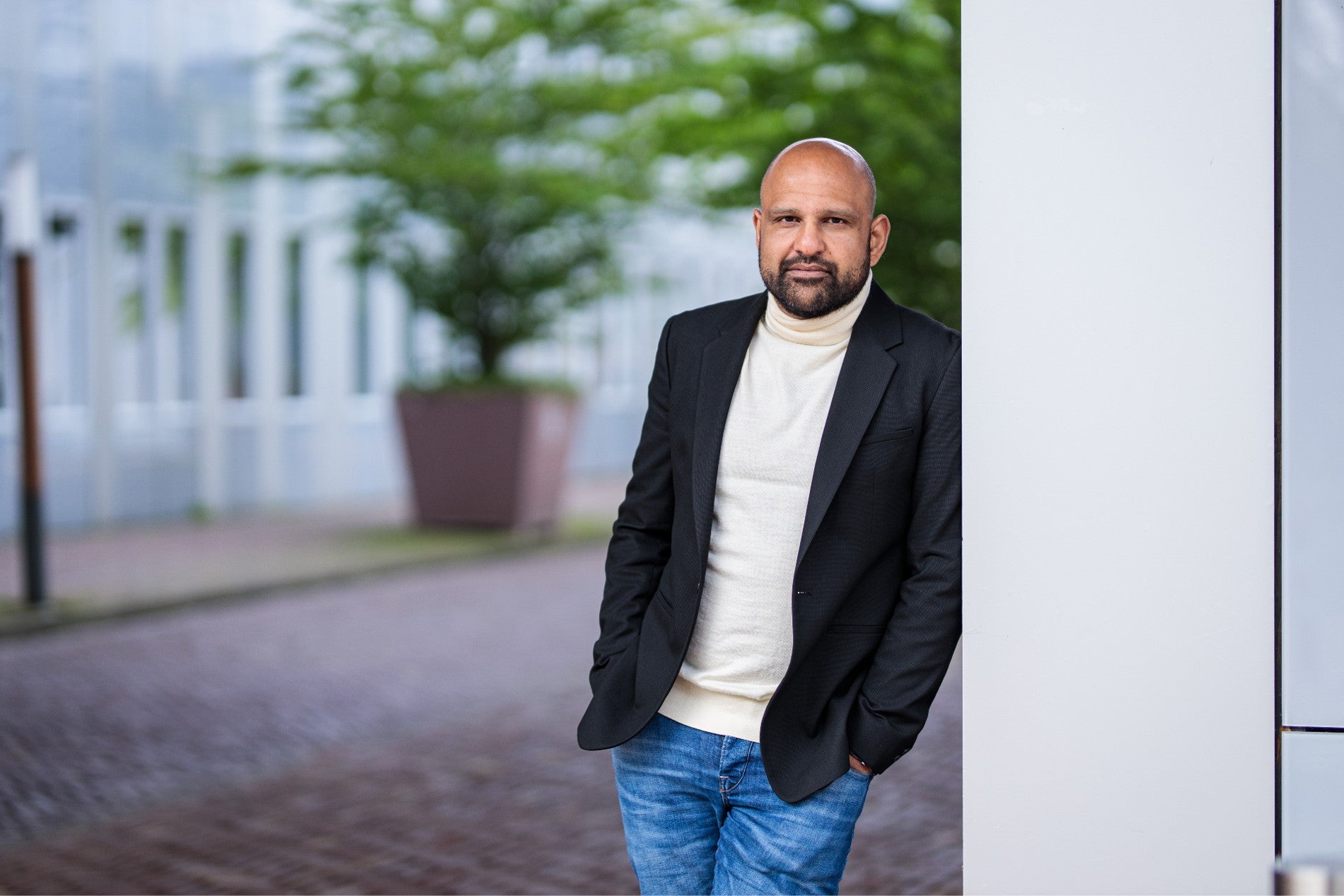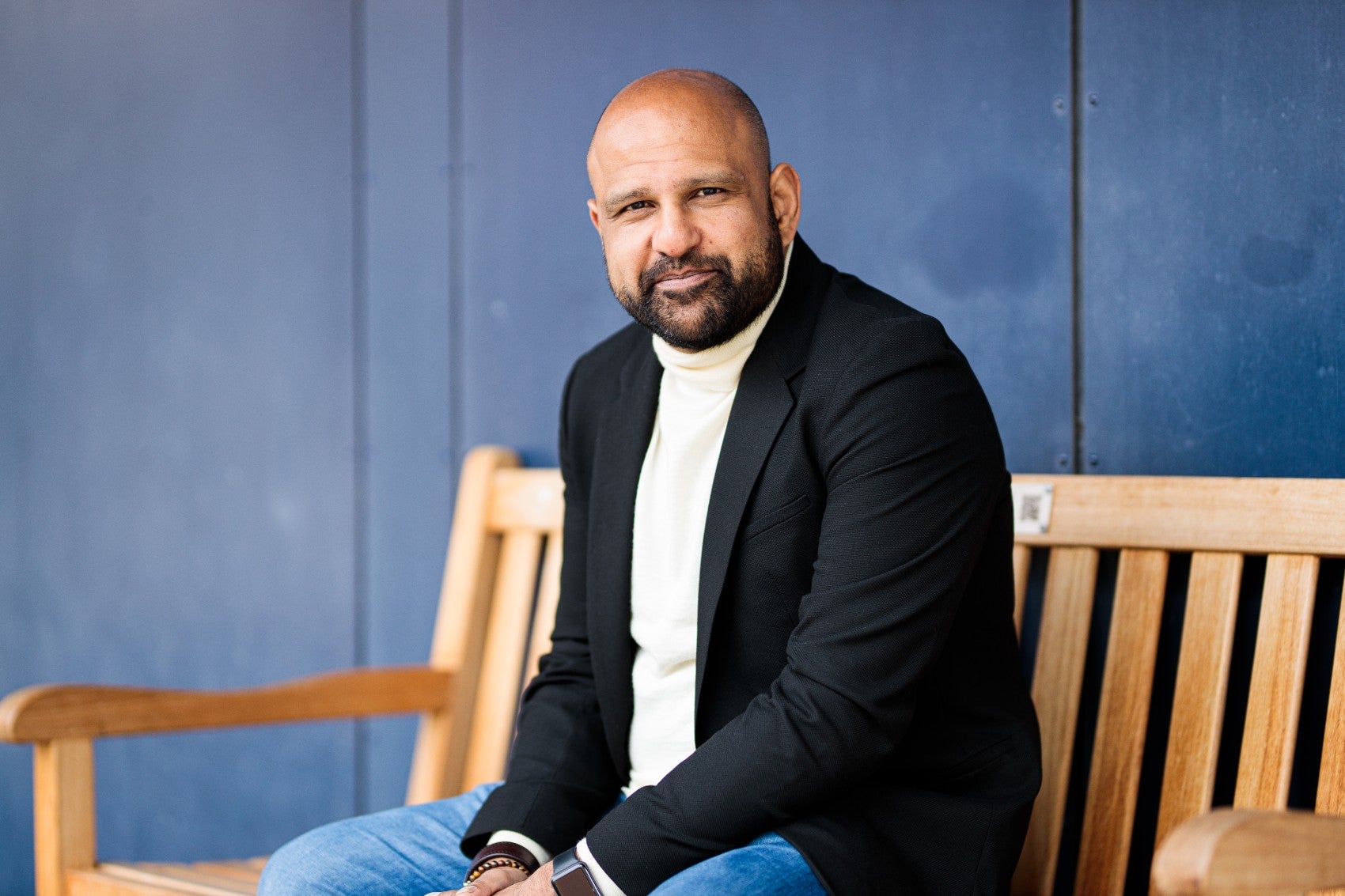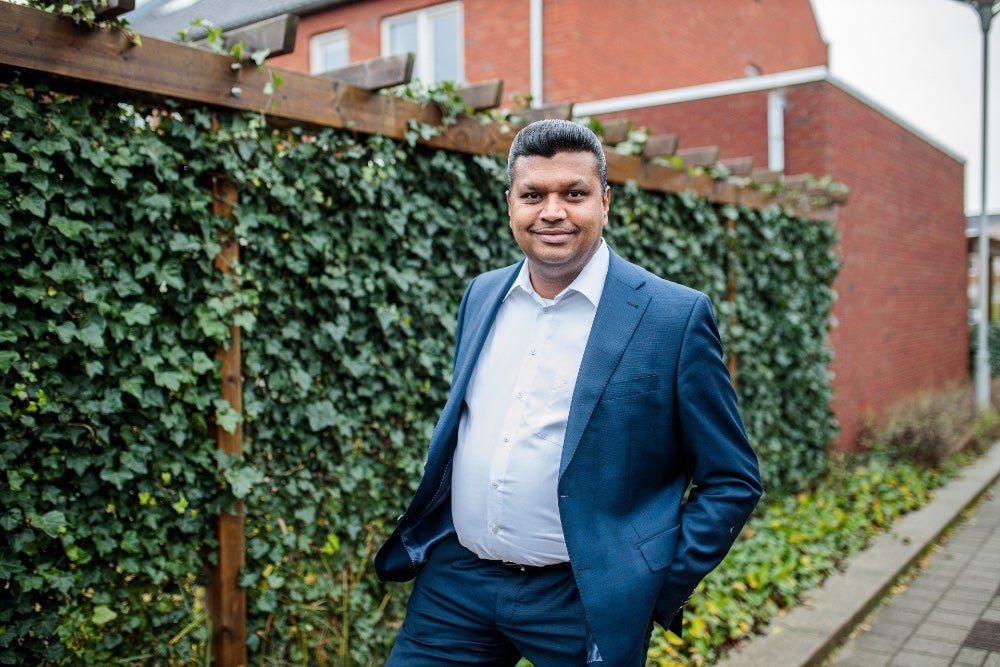Philosopher and political scientist Haroon Sheikh explores the intersection between new technologies such as AI and changing global relations.
Sheikh (42) grew up in three cultures: he has a Pakistani father, a Surinamese mother and lives in the Netherlands. ‘I feel most at home when navigating between different worlds.’
You have had a fairly diverse career: you are an endowed professor of Strategic Governance of Global Technologies at VU Amsterdam, a political scientist, a philosopher, a fellow at the Scientific Council for Government Policy (WRR) and the author of books on the rise of the East. Do you have an overarching mission?
„Essentially, I see myself as a philosopher, a thinker with a penchant for multidisciplinary work. I enjoy enriching and synthesising philosophical thought with knowledge from other disciplines and domains.
„I’m particularly interested in new technologies and their relationship to changing global relations. I’m fascinated by the interplay of innovations like AI and quantum technology – in the near future – and the forces shifting societies."
Do you think the Netherlands is sufficiently aware of the importance of artificial intelligence?
„We are now, but countries like China and the US had realised long before us. They see the world from a much more strategic perspective and don’t shy away from interventions that affect economies and technologies. In the Netherlands, the prevailing thought was that technology was best left to the whims of the free market and would sort itself out. Now, we have to run as fast as we can just to keep up. Our investments are virtually insignificant compared to the avalanche of funding in countries like China and the US."
Would the Netherlands be well served by a more strategic view?
„The Dutch government seems to be more preoccupied with putting out fires. Our political system responds primarily to crises, and any prospection we do engage in is usually limited to the economy, rather than a grand vision of what the Netherlands should look like in the future. China, on the other, sets clear goals for the future and makes an effort to achieve them. The Netherlands does not offer fertile grounds for such an approach. Our political landscape is too fragmented and, regrettably, lacks the courage."
„The disruptive impact of technologies like ChatGPT is more evident than ever before."
„It’s a shame, I have to admit. Two years ago, WRR wrote a report on AI and recommended that the government start preparing for the advent of AI. We have to act now to ensure that the Netherlands is well-equipped in the long term. Lots of the questions we raised about control and coordination two years ago have suddenly become very relevant with the launch of AI models like ChatGPT. The disruptive impact of these technologies is more evident than ever before."
In your opinion, what should we have done earlier and better?
„We made a few recommendations to the government, such as investing in demystification capabilities. In other words: making the Dutch population a little more AI-literate. We need a resilient populace who are able to distinguish what is real from what is not and who are not easily fooled."
„On top of that, we recommended that mastering AI in several sectors and domains like agriculture and healthcare would be better than becoming a jack of all trades. The Dutch government failed to embrace our recommendations, so our efforts are still rather fragmented, while our neighbours are focusing on specific sectors."
„We also recommended improving control of digital records in the Netherlands, which is now tentatively getting off the ground. At the same time, our current parliament was the first to set up a permanent committee on Digital Affairs. It’s all progressing way too slowly."

Can we ever hope to compete with China, without sacrificing key values like privacy?
„I reject the notion that innovation and economic development are incompatible with protecting your values. As a matter of fact, I think they’re perfectly compatible. Our problem is not protecting our values, it’s the scale of our ambitions, the lack of a strategic approach, planning and raising capital. We’ve got a lot of catching up to do."
„Our views on other countries can be somewhat stereotypical, as if innovations in China are fully government-led and US innovation is entirely driven by the market."
Could you argue that we are using privacy as an excuse?
„Absolutely. I’d also add that our views on other countries can be somewhat stereotypical, as if innovations in China are fully government-led, US innovation is entirely driven by the market, and the sole reason we’re lagging behind is that we’re the only ones worried about the morality of it all. I think that's a misconception, if only because people in the US and China are also concerned about ethics. The idea that we’re the only ones thinking about values is naive at best."
Does that make it a good example of our dominant Western worldview, which you’re also researching?
„Exactly. The West was the first to develop modern technology and science, giving it an enormous position of power over the rest of the world. That technological edge was accompanied by stereotypes, reducing China to a country that could only copy Western ideas or a dictatorial regime that worked everyone to the bone. Anyone taking a broader perspective would immediately find fault with such views. China is home to an ancient civilisation that was by no means inferior to ours for thousands of years. In fact, it was considerably more developed than other parts of the world. To take this new, truer perspective, however, we will have to do away with our antiquated views first."
„The war in Ukraine is another potent example. Many people are surprised by how India responded, as they refused to support our sanctions and have not condemned Russia, arguing instead that both sides are to blame. We tend to assume that because India is a democracy and we have no quarrel with them, they must share our worldview. In India, however, people even overtly disapprove of our efforts in the war, dismissing them as yet another instance of Western colonialists imposing their will on the world. These views are what my research is all about. I want to understand how people with different backgrounds view the same phenomena."
„I heard stories about Jesus at school, was taught about Allah somewhere else, and saw Hindu imagery at the same time."
How was non-Western philosophy viewed while you were a philosophy student?
„Back then, it was very black and white: the West had philosophy and the East had religion. In my university days, what we learned about Eastern philosophy was very basic. It wasn’t even recognised as fully fledged philosophy."
„Last year, my students and I worked on a book by a Chinese philosopher about the political/philosophical concept of Tianxia, or ‘all under heaven’. It’s a fascinating book, because the author addresses the question of why Chinese philosophy differs so much from Greek philosophy. Talking about this distinction and bridging the gap between these wildly divergent traditions of thought has only become a credible pursuit in the past few years."
You were raised in three cultures. Did that instil you with a sense of mental agility and a pluralist approach to truth at an early age?
„I certainly think so. There’s the fact that I was born in between different worlds and cultures and the fact that different cultures exercised greater influence on me from one moment to the next. During the summer holidays, for instance, we might spend three months in Pakistan, where you’d speak Urdu and go to the mosque. In Pakistan, we lived as a local family would."
„I was often confused and felt lost when I was younger, because I didn’t know where I belonged or what my truth was."
„The next summer, all our Surinamese relatives would come over and live with us for three months. In the Netherlands, I attended Christian schools, so I started asking questions about religion at a very early age. I heard stories about Jesus at school, was taught about Allah somewhere else, and saw Hindu imagery at the same time. I was forced to accept the fact that many people who were very close to me had completely divergent ideas about the world at a very early age. It may seem as if we’re all living in the same world, but I’ve had to exercise my fair share of empathy."
„I was often confused and felt lost when I was younger, because I didn’t know where I belonged or what my truth was. I spent a long time searching for that truth, and to make matters even more complicated, I also had my sexual orientation to deal with. I had a lovely childhood, but I’ve also always felt that I had to chart my own course, which drove me to philosophy. I also think that my upbringing is why I feel most at home when navigating between different worlds."
Want to know more? Join us at Déjà VU festival on June 15 to see Haroon Sheikh take a deep dive into the topic during the 'Philosophy at the Amsterdam Zuidas' talk show. The summer festival for the entire VU community is jam-packed with knowledge sessions and talk shows, but you’ll also have plenty of opportunities to dance among the students to performances by famous artists, browse the festival market and enjoy delicious snacks and drinks served by the best food trucks. Don’t miss out! Order your ticket now at https://vu.nl/en/about-vu/more-about/deja-vu-festival








